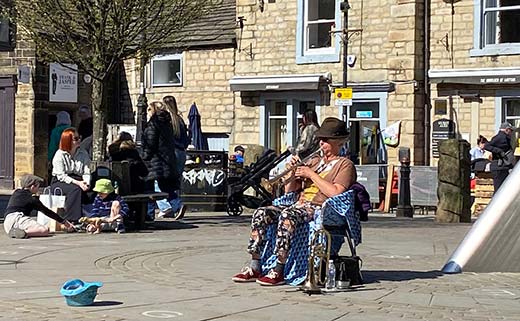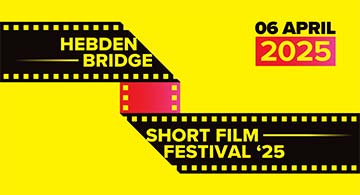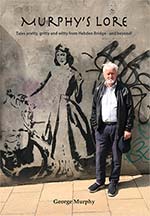
Fifth series, episode 4
All five series are available here on the HebWeb.
In the latest episode, George discusses how many cars are too many for our small town, considers what polite British phrases really mean, reviews the Short Film Festival, compares Trouser Town and Trump, suggests exercises to escape the grim reaper, shares readers’ thoughts on comics and politeness and ponders what the future holds in the lyrics of a song.
No more laps?
For a fortnight we had clear, frosty skies at night followed by sunshine that politely invited us outdoors then surprised us with cold winds. Despite the blasts from the Baltic, the town centre was packed with tourists most days. Well wrapped up folks sipped al fresco coffees, Becca blew old favourites on her trumpet and toddlers were sent to drop coins in her upturned hat. Then, for a few days, the wind dropped, heating was turned off and shorts and dresses donned. Now the forecast is for rain and cooler weather, just in time for the Easter holidays.
Outside Little H one day, two old cockney geezers sat at the next table. They’d travelled with £25 returns from London. It was the second time they’d been. One pointed to the jet trails across the azure sky and said, “That’s not right. Who knows what damage they’re causing. It was a relief during Lockdown to look up at clear skies.” He also reckoned we were all being poisoned by fluoride in the drinking water.
By the afternoons, there was just enough spaces in short stay parking bays to prevent people driving laps around the town centre, which was common practice before parking charges were raised. Still, many of the shops were busy and the cafes full. It’s clear that more people, including Japanese, Americans and even Cockneys are coming into town by coach, train or bus,
I have a friend who lived in London for decades and never bothered to use his car. He got everywhere he wanted to go by foot, bike, bus or tube. In the UK there are far more cars than spaces to park and we get angry when we visit hospitals, airports and local shops and have to queue in traffic jams before paying hefty charges.
Hebden Bridge is a small town and it’s a victim of its own success. The old NatWest building opposite the park gates has reopened again as a cafe rather than a weekend boozer with a tacos restaurant on Bridge Gate soon to follow. It’s a painful process for locals who enjoyed the convenience of popping into town for free, but if more people leave their cars at home, air quality in the valley and the health of our kids might improve.

Polite English phrases
Researchers have uncovered some of the polite phrases we British use which have hidden meanings.
“Ooh, could I just squeeze pass you?” Meaning: Shift.
Invited to a social event: “Sounds fun, I’ll let you know.” Meaning: No chance.
“I beg your pardon?” Meaning: How dare you say that you bastard.
“Sorry, I’m a bit busy.” Meaning: Go away.
“No rush. When you have a minute.” Meaning: Get a bloody move on!
“With all due respect.” Meaning: You’re wrong and here’s why …
“Not to worry.” Meaning: This is a disaster.
“I hear what you’re saying.” Meaning: You’re talking rubbish.
“Just a gentle reminder.” Meaning: You should have done this ages ago.
“Oh, that’s unusual.” Meaning: You’ve got terrible taste.
PW added: “I’m not racist but …” Meaning: I’m about to say something racist.
Ian Dobson: “May I suggest?” means “shut up and listen.”
Stephanie Bowgett: My mum used to start commands with “would you like to …” To which you only dare answer, “Yes!”
Matt Lupton-Levy: “Mustn’t grumble.” Meaning either A “I spare you the terrible details,” or B, “ don’t want to boast about how well everything is in case you get jealous about how well everything is going.”
Jenny Nicholson: “Can we not do this please?” Jenny didn’t specify the meaning, but gave me a tick when I asked if it was her responding to grandchildren.
Heather Wilson: “ … please don’t take this the wrong way.” Also: “Don’t take this personally, but …”
Seeing my post, Abi Lupton-Levy wrote, ‘Apart from the last one, I’m profoundly glad that people don’t just go round ordering people to “shift.”
Which is absolutely right. Although sometimes politeness gets in the way of clear statements when they are needed. In the Korean War the Americans sent a message to the Brits to see if they needed reinforcements. Our desperate wireless operator sent the message, “We’re just about hanging on.” So the Yanks didn’t send much needed relief forces.

Hebden Bridge Short Film Festival
It’s the third time I’ve attended the Hebden Bridge Film Festival. First time I went I misjudged the distance to my seat as the lights went down and spilt my precious but very cold red wine over my lap before watching a great film about Frank Sidebottom. Next time I sat in the stalls in the mass audience for the Lionesses film and left my cap behind. This time I was about to depart after the short film awards were announced when a man pointed to my wallet which somehow had escaped from my jacket onto the floor.
I agreed with the judges that The Test was the outstanding short film in this year’s competition. The main character, played by Emma Lau, had to pass a Life in the UK computer based test to achieve naturalisation as a British citizen, by rote learning information from an official handbook. Director, Hsieh Meng Han told the audience after the screening that she wanted to alert UK citizens to the expense and pressure involved in passing the exam and the real feelings of the cowed participants was powerfully expressed through a short dream sequence.
Rhubarb Rhubarb wasn’t entered in the competition, possibly because of its starry cast (Joanna Scanlon and David Hargreaves) and the film’s previous entry into a European festival. We weren’t told. But I’m delighted we could watch it. Directed by Kate McMullen, who also co-wrote the script with Paul Wauters, it was set in the famous rhubarb triangle, although the pull away shots showed the farm between the thundering west and east carriageways of the M62 near Rishworth. The brilliantly delivered one liners triggered howls of laughter from the large audience.
Sandcastles, a yellowy, sunshiny and poignant six minute animated feature from post grad student Meredith Stewart, was the worthy winner of the runner up award (awarded by the Fox and Goose) and managed to deliver its wistful tale in six minutes.
Kidda won the audience award and received a special commendation for the young actor playing Jude. Director Fraser Gordon took a year off from teaching, supported by his wife who told him to ‘follow his dream’. Gordon said he loved the mix of sadness and gritty humour in the great northern films and that was the style he successfully pitched for. Like Rhubarb, Rhubarb, first you laughed then were surprised into sadness.
There wasn’t a dud in the nine entries and I particularly enjoyed Kitty and her accordion and lapsed into nostalgic Scouse chat when I nattered to the director Roz Di Caprio after the screenings.
I had to miss the earlier Calderdale short film competition but was delighted to discover that Pegs and Bacon, a 9 minute documentary about May’s shop, was the clear winner. Congratulations to Sarah Nicola Mason and her team – and to May, who didn’t attend, probably because, as Sarah suggested, she had a shop to run.
Trouser town
Another mill chimney has bitten the dust, a toppled totem of our once thriving cloth industry.
In America, Trump wants to make manufacturing great again, but as Bill Maher, standup comedian and TV host, asked, "Why do we want to go back to the 1970s? We’re never going to manufacture jeans for cheaper than 7 dollars. And who’s going to make them anyway? To which his economist guest answered, ‘Robots!’ "
Hebden Bridge was once known as Trouser Town, but in the 50s and early 60s the cloth trade collapsed because of cheap clothes imported from Asia and the hippies moved in.
Bottoms up and forward thrust!
According to a pull out section in The Times, if you can’t sit down on the floor from a standing position and then stand up again, (using one hand to help a safe descent and one on the ascent) you’ve only got 6 years to live. As I haven’t been able to do this for years my demise might happen any time soon.
Fortunately, I read elsewhere that if I perform an exercise called The Forward Thrust once a day, I’ll live for many more years. The rules are: stand on one leg, thrust arms out straight ahead and fully extend your non-standing leg behind you into a horizontal position. Unfortunately, I’ve forgotten how long you should maintain this position. My record so far is a wobbly three seconds. One tip: stand next to soft furnishing until you really get the hang of it.
Growing pains
There’s a HebWeb interview feature on local photographer, mountaineer and publisher Mick Ryan, who reckons the world can’t afford to go for growth. We need to live simpler lives and we’re probably nearer to catastrophe than we think. On which matters, I once wrote a song.
My daughter’s darling daughter
Vikings, Normans, such as these,
Came to these islands as newcomers,
These verdant lands in pewter seas,
Shone emerald bright in rainbow summers.
With birds tumultuous in the trees,
And fish abundant in clear water,
Oh, I would like to leave you these,
My daughter’s darling daughter.
CHORUS
But it’s late, grandad it’s too late,
Smell the smoke from the redwood trees,
And it’s late grandad it’s too late,
Hear the ice crash in Arctic seas.
With barefoot print on jewelled grass,
When nights are short and days are longer,
Be sure these precious hours to grasp,
My daughter’s darling daughter.
CHORUS
With valleys cleared of poison air
And moorlands rid of rich men’s slaughter,
I close my eyes and see you there,
My daughter’s darling daughter.
CHORUS
Readers write
Re Comic comments in episode 3
Tony Goodall wrote from 'Sunny, spring-like Cragg Vale': Alf Tupper, - The Tough of the Track – lived in Greystone and worked in Bill Moggs’ scrap yard. His passion was running, often against elite ‘toffs’ who looked down on our working class hero, usually had better running shoes and could afford decent accommodation at running events, whereas Alf sometimes slept rough or in his truck. I recall an episode when one evening Alf is reprimanded by a friendly copper for thoughtlessly throwing away his fish and chip paper. In his next race he is leading the field when some litter blows across the track – naturally Alf stops to pick up the rubbish and thus loses the race.
Q: And the moral is …
Q: What happened to Alf, when he became too old to run? Perhaps he took over bill’s scrapyard? Did he become over-weight and unhealthy because of his ever favourite grub – fish and chips?
George: Well, Alf is a comic immortal, never sully his memory with real life issues.
Jill Robinson: Hi George – I share my birthday with Dennis the Menace who first appeared in the Beano on 17 March 1951. The comic was founded earlier but Dennis arrived 74 years ago (Despite reading and enjoying belle of the Ballet,) I was hopeless at dancing, my mum sent me to the Daphne Braine school of Dance in Tiverton where rotund five year old me struggled to get my foot up on the barre. When we performed Little Miss Muffet I was in the back row of the spiders wearing an itchy black costume, no pretty pink tutu for me). Keep up the entertaining column!
George: Btw, Jill, being in the 1950/51 cohort, we both miss out on the higher pension payments paid to summer born pupils who were in our class at school!
Thanks to famous folk singer Steve Tilston, whose Last Call CD we’re humming along to on our out of town drives, for letting me know he is enjoying ‘dipping into’ the Murphy’s Lore book.
Murphy's Lore, the book, is available to order here
If you would like to send a message about this piece or suggest ideas, email George Murphy
More Murphy's Lore
See the Murphy's Lore home page for over 150 episodes.


